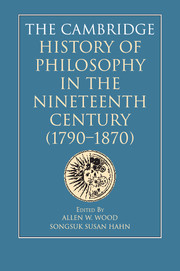Book contents
- Frontmatter
- Contents
- Contributors
- Preface
- Abbreviations
- Introduction
- I Philosophy in the Nineteenth Century
- II Logic and Mathematics
- III Nature
- IV Mind, Language, and Culture
- 8 Psychology
- 9 Language
- 10 The Emergence of the Human Sciences from the Moral Sciences
- 11 The Beautiful and the Good
- V Ethics
- VI Religion
- VII Society
- VIII History
- References
- Index
- References
8 - Psychology
from IV - Mind, Language, and Culture
Published online by Cambridge University Press: 05 December 2012
- Frontmatter
- Contents
- Contributors
- Preface
- Abbreviations
- Introduction
- I Philosophy in the Nineteenth Century
- II Logic and Mathematics
- III Nature
- IV Mind, Language, and Culture
- 8 Psychology
- 9 Language
- 10 The Emergence of the Human Sciences from the Moral Sciences
- 11 The Beautiful and the Good
- V Ethics
- VI Religion
- VII Society
- VIII History
- References
- Index
- References
Summary
Throughout the eighteenth and nineteenth centuries, psychology was the study of the soul or mind, or, with greater ontological modesty, of mental powers, capacities, and phenomena. Insofar as these investigations concerned mind as substance and its relation to the body, they were metaphysical. Insofar as they concerned the cognitive abilities of the mind and the basis of and limits to human knowledge, they were epistemological (a term coined in the 1840s). Insofar as they concerned the description and explanation of various psychological phenomena, they were studies in empirical and theoretical psychology, which may be called scientific psychology, where “science” connotes empirical or natural science, that is, systematic knowledge based in observation or experience.
The quantitative experimental scientific psychology that became prominent by the turn of the twentieth century grew from three main areas of intellectual inquiry. First and most directly, it arose out of the traditional psychology of the philosophy curriculum, as expressed in theories of mind and cognition. Second, it adopted the attitudes of the new natural philosophy of the scientific revolution, attitudes of empirically driven causal analysis and exact observation and experimentation. Third, it drew upon investigations of the senses. Natural philosophical disciplines such as optics and acoustics treated the functioning of the senses. Optics, in particular, had from antiquity comprised a complete theory of vision, combining the physics, physiology, psychology, metaphysics, and epistemology of vision, using mathematical techniques where feasible. Within medicine, sensory physiology examined anatomy, physiology, and pathology. Philosophical psychology had long examined the senses as mental capacities connected with cognition and knowledge, and such discussions also heeded the new attitudes of natural philosophy.
- Type
- Chapter
- Information
- Publisher: Cambridge University PressPrint publication year: 2012
References
- 3
- Cited by

